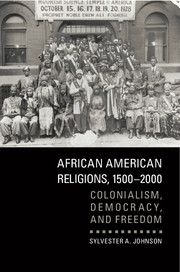Book contents
- Frontmatter
- Contents
- List of Figures
- Acknowledgments
- Introduction
- PART ONE
- PART TWO
- 4 Stateless Bodies, African Missions, and the Black Christian Settler Colony
- 5 Black Political Theology, White Redemption, and Soldiers for Empire
- PART THREE
- Conclusion: Black Religion, Freedom, and Colonialism
- Selected Bibliography
- Index
4 - Stateless Bodies, African Missions, and the Black Christian Settler Colony
from PART TWO
Published online by Cambridge University Press: 05 August 2015
- Frontmatter
- Contents
- List of Figures
- Acknowledgments
- Introduction
- PART ONE
- PART TWO
- 4 Stateless Bodies, African Missions, and the Black Christian Settler Colony
- 5 Black Political Theology, White Redemption, and Soldiers for Empire
- PART THREE
- Conclusion: Black Religion, Freedom, and Colonialism
- Selected Bibliography
- Index
Summary
In this chapter I examine the confluence of Christian missionary religion and Black settler colonialism. I do so within the context of the Anglo-American Revolution, which spawned the formal creation of the US racial state. What began as an Anglo-American rebellion against the British Crown became a mixed opportunity for African slaves to strike a blow for their own freedom. The unlikely prospect of British defeat, however, became an eventual success for Anglo-American rebels. This left those Africans supporting the British royal military in an uncertain plight. They had joined the British understanding clearly that doing so constituted their best hope for freedom, which had been promised to them in exchange for their military service. This turn of events eventually became the chief factor in the creation of Black settler colonies, first in Nova Scotia, then in Sierra Leone, and subsequently Liberia.
Although Black settler colonialism emerged fully within the context of Atlantic slavery, the specific histories of this movement set before us the peculiar problem of free Africans, not slaves per se. Of course, as we shall see, free Africans in the Americas were rarely far removed from slavery, often because they were either manumitted by slaveholders or recaptured from slave ships or because freeborn Africans in the Americas were themselves descended from ex-slaves.1 As a result, the focus of free Africans that ensues should in no way be interpreted as an effort to sidestep the problem of slavery. Rather, the aim here is to underscore the immense role that slavery plays in the pageantry of freedom. The extent of this connection is not so easily visible, so our treatment of Black settler colonialism should begin to elucidate it further. With few exceptions, scholars have generally treated the subject of Black settler colonialism using the rubric of “emigrationism” or “Negro colonization.” This language is certainly not unwarranted, especially given the fact that such terminology was employed by the historical actors themselves. One unfortunate result of this convention, however, is its tendency to elide Black emigration's role in the lineage of democratic settler states. As will become evident, these Black settlements had everything to do with the larger phenomenon of settler colonialism that shaped the Atlantic world. To lose sight of this fact is to miss much of what inspired them and what they demonstrate about the problem of freedom.
- Type
- Chapter
- Information
- African American Religions, 1500–2000Colonialism, Democracy, and Freedom, pp. 159 - 208Publisher: Cambridge University PressPrint publication year: 2015



